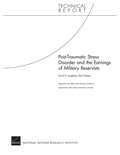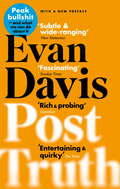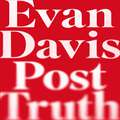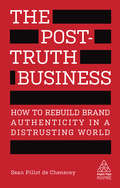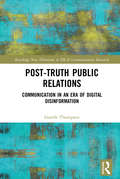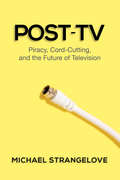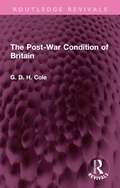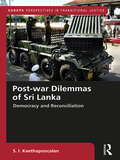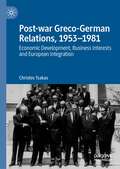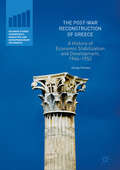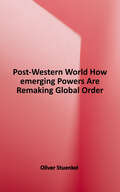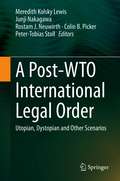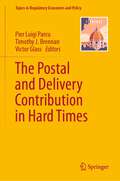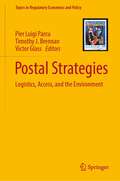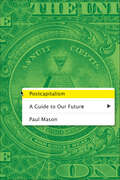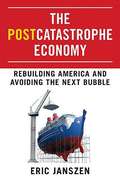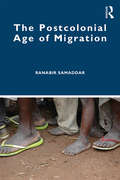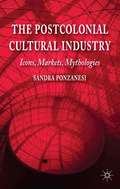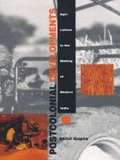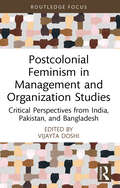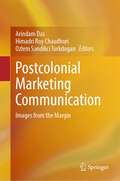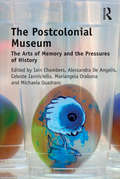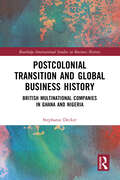- Table View
- List View
Post-Traumatic Stress Disorder and the Earnings of Military Reservists
by David S. Loughran Paul HeatonAn investigation of the effects of having symptoms of post-traumatic stress disorder (PTSD) on the labor market earnings of reservists in the years following deployment.
Post-Truth: Why We Have Reached Peak Bullshit and What We Can Do About It
by Evan Davis'A Malcolm Gladwell-style social psychology/behavioural economics primer' Evening StandardLow-level dishonesty is rife everywhere, in the form of exaggeration, selective use of facts, economy with the truth, careful drafting - from Trump and the Brexit debate to companies that tell us 'your call is important to us'. How did we get to a place where bullshit is not just rife but apparently so effective that it's become the communications strategy of our times? This brilliantly insightful book steps inside the panoply of deception employed in all walks of life and assesses how it has come to this. It sets out the surprising logic which explains why bullshit is both pervasive and persistent. Why are company annual reports often nonsense? Why should you not trust estate agents? And above all, why has political campaigning become the art of stretching the truth? Drawing on behavioural science, economics, psychology and of course his knowledge of the media, Evan ends by providing readers with a tool-kit to handle the kinds of deceptions we encounter every day, and charts a route through the muddy waters of the post-truth age.
Post-Truth: Why We Have Reached Peak Bullshit and What We Can Do About It
by Evan DavisLow-level dishonesty is rife everywhere, in the form of exaggeration, selective use of facts, economy with the truth, careful drafting - from Trump and the Brexit debate to companies that tell us 'your call is important to us'. How did we get to a place where bullshit is not just rife but apparently so effective that it's become the communications strategy of our times? This brilliantly insightful book steps inside the panoply of deception employed in all walks of life and assesses how it has come to this. It sets out the surprising logic which explains why bullshit is both pervasive and persistent. Why are company annual reports often nonsense? Why should you not trust estate agents? And above all, why has political campaigning become the art of stretching the truth? Drawing on behavioural science, economics, psychology and of course his knowledge of the media, Evan ends by providing readers with a tool-kit to handle the kinds of deceptions we encounter every day, and charts a route through the muddy waters of the post-truth age.
Post-Truth: Why We Have Reached Peak Bullshit and What We Can Do About It
by Evan Davis'A Malcolm Gladwell-style social psychology/behavioural economics primer' Evening StandardLow-level dishonesty is rife everywhere, in the form of exaggeration, selective use of facts, economy with the truth, careful drafting - from Trump and the Brexit debate to companies that tell us 'your call is important to us'. How did we get to a place where bullshit is not just rife but apparently so effective that it's become the communications strategy of our times? This brilliantly insightful book steps inside the panoply of deception employed in all walks of life and assesses how it has come to this. It sets out the surprising logic which explains why bullshit is both pervasive and persistent. Why are company annual reports often nonsense? Why should you not trust estate agents? And above all, why has political campaigning become the art of stretching the truth? Drawing on behavioural science, economics, psychology and of course his knowledge of the media, Evan ends by providing readers with a tool-kit to handle the kinds of deceptions we encounter every day, and charts a route through the muddy waters of the post-truth age.
The Post-Truth Business: How to Rebuild Brand Authenticity in a Distrusting World (Kogan Page Inspire)
by Sean Pillot de CheneceyBrands are built on trust, but in a post-truth world they're faced with a serious challenge: so much of modern life is defined by mistrust. A shattering of the vital trust connection between brands and consumers, together with the evaporation of authenticity as a core brand pillar, is causing enormous problems for businesses on a global scale. If a brand isn't seen as trustworthy, then when choice is available it will be rejected in favour of one that is.The Post-Truth Business provides a way forward for any organization wishing to rebuild brand authenticity in a distrustful world. It explains the interconnected problems facing businesses, with important topics including:- The impact of fake news, disinformation and the weaponizing of lies- The safeguarding of privacy, alongside privacy as a tradable asset- Why and how brands must create communication with meaning- The dangers of inauthentic cultural marketing activities- Examples of conscious capitalism and brand activism- Lessons in authenticity from artisans and innovators- National branding and reputation capital- Leveraging the power of 'brand trust' The Post-Truth Business shows how to strengthen consumer engagement by closing the 'brand credibility gap'. It's packed with examples of inspiring people, brands and international campaigns from the fashion, beauty, outdoor, motor, drinks, finance, media, technology, entertainment and health sectors. Each of them demonstrates a dynamic and positive way forward.
Post-Truth Public Relations: Communication in an Era of Digital Disinformation (Routledge New Directions in PR & Communication Research)
by Gareth ThompsonThis book explores the purpose, practice and effects of public relations (PR) at a time that has been variously described as an era of populism, post-truth and fake news. It considers how PR processes have contributed to the current social condition of post-truth and what constitutes PR work in this environment. Post-Truth Public Relations: Communication in an Era of Digital Disinformation proposes that while we can now look back upon the last 80–100 years as a period of classical PR, that style is being supplemented by the emergence of a post-classical form of PR that has emerged in response to the post-truth era. This new style of PR consists of a mixed repertoire of communicative work that matches the new geometry of digital media and delivers a mix of online engagement and persuasion in order to meet the needs of increasingly partisan audiences. Using contemporary case studies and original interviews with PR practitioners in several countries, including China and the Philippines, the book investigates how PR workers have reconciled their role as communicative intermediaries with the post-truth era of digital disinformation. This thought-provoking book will be of great interest to researchers and advanced students interested in the changing nature of PR and its practice.
Post-TV
by Michael StrangeloveIn the late 2000s, television no longer referred to an object to be watched; it had transformed into content to be streamed, downloaded, and shared. Tens of millions of viewers have "cut the cord," abandoned cable television, tuned into online services like Netflix, Hulu, and YouTube, and also watch pirated movies and programmes at an unprecedented rate. The idea that the Internet will devastate the television and film industry in the same way that it gutted the music industry no longer seems farfetched. The television industry, however, remains driven by outmoded market-based business models that ignore audience behaviour and preferences.In Post-TV, Michael Strangelove explores the viewing habits and values of the post-television generation, one that finds new ways to exploit technology to find its entertainment for free, rather than for a fee. Challenging the notion that the audience is constrained by regulatory and industrial regimes, Strangelove argues that cord-cutting, digital piracy, increased competition, and new modes of production and distribution are making audiences and content more difficult to control, opening up the possibility of a freer, more democratic, media environment.A follow-up to the award-winning Watching YouTube, Post-TV is a lively examination of the social and economic implications of a world where people can watch what they want, when they want, wherever they want.
The Post-War Condition of Britain (Routledge Revivals)
by G.D.H. ColeFirst published in 1956, The Post-War Condition of Britain measures the extent of changes in Britain since the thirties. It contains more than two hundred tables on such matters as the national income, employment, production and productivity, investment and consumption; health, education, housing, and the insurance, assistance and similar services; on Trade Unions and industrial relations; class structure, political attitudes and party organizations; and the problems of local government and town and country planning. It is simply written, demanding from the reader the minimum of technical knowledge of economics or other specialized studies, and it should serve as an invaluable reference book for all who need exact information.
Post-war Dilemmas of Sri Lanka: Democracy and Reconciliation (Europa Perspectives in Transitional Justice)
by S. I. KeethaponcalanBy investigating Sri Lanka as a case study, this book examines whether democracy, compared to authoritarianism, is conducive to post-war reconciliation. The research, founded on primary as well as secondary data, concludes that political systems have little to do with the success or failure of post-war ethnic reconciliation. The Sri Lankan case indicated that post-war reconciliation is more contingent on the readiness of the former enemies to come together. Readiness stems from, for example, satisfaction in the way issues have been resolved, confidence in the other party's intentions, and the compulsion to coexist. If the level of satisfaction, confidence, and the compulsion to coexist are low, the readiness to reconcile will also be low. The end of the war had a profound impact on post-war governance and ethnic relations in Sri Lanka. Hence, the volume provides an in-depth analysis of the factors that led to the military victory of the Sri Lankan government over the Liberation Tigers of Tamil Eelam (LTTE) in 2009. The chapters delve into the nexus between governance and reconciliation under the first two post-war governments. Reconciliation did not materialize in this period. Instead, new fault-lines emerged as attacks on the Muslim community escalated drastically. This book provides a comprehensive analysis of the nature of relations between the Sinhalese and Muslims and the Tamils and Muslims, as well as the nature and causes of post-war anti-Muslim riots.
Post-war Greco-German Relations, 1953–1981: Economic Development, Business Interests and European Integration
by Christos TsakasThis book explores the post-war Greco-German relationship and asks how this relationship fits into, and changes, the narrative of European integration. The book highlights West Germany’s role in shaping Greece’s development model and argues that Greece's accession to the Community in 1981 had a long back story in the modernization strategies adopted by the two countries as early as the 1950s. The success, not the failure, of those strategies lies at the root of Greece's lingering balance of payments problems: the ever-widening trade deficit with Germany, the country’s main trading partner, was the price of Greek economic growth in the decades following the war. By addressing this three-decade story of uneasy continuity, the book offers new insights into core-periphery relations in Europe, questions the conventional wisdom about Greece’s path to Europe, and challenges the way the so-called North-South divide has been adduced to explain the recent euro crisis. In doing so, the author calls attention to past cooperation between leading political and business circles in Greece and Germany, making this a useful and insightful read for historians and political scientists alike.
The Post-War Reconstruction of Greece
by George PolitakisThe book presents the first comprehensive account of how economists, engineers and industrialists mapped out the economic future of Greece in the aftermath of civil war devastation. It documents the policy debate that took place among Greece and its sponsors about the future course of the economy, the required investment and their financing. Through historical narrative, archival sources and oral history, this book offers a better understanding of the achievements proclaimed by many economists as an "economic miracle".
Post-War U.S. Economic Statistics, Data Supplement
by Cherie Nursalim Julio J. RotembergSupplements Tax Cut of 1964 (9-382-078), Nixon's Economic Strategy--1969 (8-378-258), and The Reagan Plan (9-381-173).
Post-Western World: How Emerging Powers are Remaking Global Order
by Oliver StuenkelWith the United States' superpower status rivalled by a rising China and emerging powers like India and Brazil playing a growing role in international affairs, the global balance of power is shifting. But what does this mean for the future of the international order? Will China dominate the 21st Century? Will the so-called BRICS prove to be a disruptive force in global affairs? Are we headed towards a world marked by frequent strife, or will the end of Western dominance make the world more peaceful? <p><p>In this provocative new book, Oliver Stuenkel argues that our understanding of global order and predictions about its future are limited because we seek to imagine the post-Western world from a parochial Western-centric perspective. Such a view is increasingly inadequate in a world where a billions of people regard Western rule as a temporary aberration, and the rise of Asia as a return to normalcy. In reality, China and other rising powers that elude the simplistic extremes of either confronting or joining existing order are quietly building a "parallel order" which complements today's international institutions and increases rising powers' autonomy. Combining accessibility with expert sensitivity to the complexities of the global shift of power, Stuenkel's vision of a post-Western world will be core reading for students and scholars of contemporary international affairs, as well as anyone interested in the future of global politics.
A Post-WTO International Legal Order: Utopian, Dystopian and Other Scenarios
by Meredith Kolsky Lewis Colin B. Picker Peter-Tobias Stoll Junji Nakagawa Rostam J. NeuwirthThis book provides readers with a unique opportunity to explore how the international economic legal order (IELO) may look in a post-WTO world. The substance of this book presupposes (whether correct or not) that the WTO either: (a) Stagnates into the foreseeable future (Doha withers, no new Rounds, at best minor amendments, little new jurisprudence, effective collapse of the DSB); or (b) Falls apart completely. While neither is desirable, the book underlines that it must be conceded that neither is inconceivable. The collapse of the Soviet Union tells us that anything is possible (in 1986 no one foresaw the end of the Cold War - clearly it was a much more significant event than would be the case for the demise of the WTO and the current international economic legal order (IELO)). Similarly, just a year or two before Brexit or the election of US President Donald Trump, no one foresaw those two eventualities. Consequently, a worst-case scenario for the future of the WTO cannot be ignored – rather, it must be explored, as has been done in this book. Indeed, despite most IEL academics’ commitment to multilateralism and specifically to a vibrant and dynamic WTO, academics in the field are now beginning to seriously discuss what a post-WTO world could look like (and it was the project behind this book that first launched those discussions). Accordingly, this examination of the post-WTO world will be of great value to practitioners, governmental and international officials and scholars in the IELO. This is particularly so in an era of increasingly rapid change, during which legal scholarship must also address the future if it wants to contribute creative solutions to the resolution and management of the many serious contemporary problems facing our field.
The Postal and Delivery Contribution in Hard Times (Topics in Regulatory Economics and Policy)
by Pier Luigi Parcu Timothy J. Brennan Victor GlassThis book includes original essays by prominent researchers and practitioners in the field of postal and delivery economics, originally presented at the 29th Conference on Postal and Delivery Economics held online, September 1-3, 2021. The central focus of the book is the short and long-term impact of covid-19 pandemic on the sectors, both from the economic and regulatory perspectives. Other important topics include the unstoppable growth of e-commerce and the implications for delivery market; solutions for the “last mile”, and the associated challenges in terms of sustainability. Chapters also discuss traditional topics for postal and delivery sectors, such as the competitive dynamics in the sector, the business strategies of postal operators, as well as the definition and funding of the Universal Service Obligation. This book will be a useful tool not only for graduate students and professors interested in postal and regulatory economics, but also for postal administrations, consulting firms, and federal government departments.
Postal Strategies: Logistics, Access, and the Environment (Topics in Regulatory Economics and Policy)
by Pier Luigi Parcu Timothy J. Brennan Victor GlassThis edited book includes original essays by prominent researchers and practitioners in the field of postal and delivery economics, originally presented at the 30th Conference on Postal and Delivery Economics held in Rimini, Italy, May 25–27, 2022. The central foci of the book are the role of digital platforms in the postal sector and the impact of vertically integrated firms in delivery markets. Other important topics include the regulation of parcels and their environmental footprint, in light of the innovations affecting the so-called last mile, and the effects of the COVID-19 pandemic on the postal sector, on both the global and local levels. Chapters also discuss traditional topics for postal and delivery sectors, including postal costs, the funding of Universal Service Obligation (USO) and the related role of Universal Service Providers. This book is a useful tool not only for graduate students and professors interested in postal and regulatory economics but also for postal administrations, consulting firms, and federal government departments.
Postcapitalism: A Guide to Our Future
by Paul MasonWe know that our world is undergoing seismic change—but how can we emerge from the crisis a fairer, more equal society?Over the past two centuries or so, capitalism has undergone profound changes—economic cycles that veer from boom to bust—from which it has always emerged transformed and strengthened. Surveying this turbulent history, Paul Mason’s Postcapitalism argues that we are on the brink of a change so big and so profound that this time capitalism itself, the immensely complex system within which entire societies function, will mutate into something wholly new. At the heart of this change is information technology, a revolution that is driven by capitalism but, with its tendency to push the value of much of what we make toward zero, has the potential to destroy an economy based on markets, wages, and private ownership. Almost unnoticed, in the niches and hollows of the market system, swaths of economic life are beginning to move to a different rhythm. Vast numbers of people are changing how they behave and live, in ways contrary to the current system of state-backed corporate capitalism. And as the terrain changes, new paths open. In this bold and prophetic book, Mason shows how, from the ashes of the crisis, we have the chance to create a more socially just and sustainable economy. Although the dangers ahead are profound, he argues that there is cause for hope. This is the first time in human history in which, equipped with an understanding of what is happening around us, we can predict and shape the future.
The Postcatastrophe Economy
by Eric JanszenHow government and business can work together to secure our economic future. The 2008 crisis was just the beginning; according to sought-after analyst Eric Janszen, an even bigger financial catastrophe is imminent. Inclined to disbelieve him? He predicted the last two busts months before they happened. Our problems, according to Janszen, are rooted in the flaws of the debt-driven FIRE economy (Finance, Insurance, and Real Estate). Applying the tried-andtrue methods of currency depreciation, tax and interest rate cuts, and fiscal stimulus will not work this time around. The only way out is to change our fundamental approach. The solution is to use private and public monies to develop major for- profit transportation, energy, and communications infrastructure projects. These projects will spark employment and growth, reduce U.S. dependence on foreign energy and our foreign debt, and improve the efficiency of the economy for all growth industries in the twenty-first century. This thought-provoking book offers solutions for a more sustainable and stable economic future.
The Postcolonial Age of Migration
by Ranabir SamaddarThis book critically examines the question of migration that appears at the intersection of global neo-liberal transformation, postcolonial politics, and economy. It analyses the specific ways in which colonial relations are produced and reproduced in global migratory flows and their consequences for labour, human rights, and social justice. The postcolonial age of migration not only indicates a geopolitical and geo-economic division of the globe between countries of the North and those of the South marked by massive and mixed population flows from the latter to the former, but also the production of these relations within and among the countries of the North. The book discusses issues such as transborder flows among countries of the South; migratory movements of the internally displaced; growing statelessness leading to forced migration; border violence; refugees of partitions; customary and local practices of care and protection; population policies and migration management (both emigration and immigration); the protracted nature of displacement; labour flows and immigrant labour; and the relationships between globalisation, nationalism, citizenship, and migration in postcolonial regions. It also traces colonial and postcolonial histories of migration and justice to bear on the present understanding of local experiences of migration as well as global social transformations while highlighting the limits of the fundamental tenets of humanitarianism (protection, assistance, security, responsibility), which impact the political and economic rights of vast sections of moving populations. Topical and an important intervention in contemporary global migration and refugee studies, the book offers new sources, interpretations, and analyses in understanding postcolonial migration. It will be useful to scholars and researchers of migration studies, refugee studies, border studies, political studies, political sociology, international relations, human rights and law, human geography, international politics, and political economy. It will also interest policymakers, legal practitioners, nongovernmental organisations, and activists.
The Postcolonial Cultural Industry
by Sandra PonzanesiThe Postcolonial Cultural Industry makes a timely intervention into the field of postcolonial studies by unpacking its relation to the cultural industry. It unearths the role of literary prizes, the adaptation industry and the marketing of ethnic bestsellers as new globalization strategies that connect postcolonial artworks to the market place.
Postcolonial Developments: Agriculture in the Making of Modern India
by Akhil GuptaThis definitive study brings together recent critiques of development and work in postcolonial studies to explore what the postcolonial condition has meant to rural people in the Third World. Focusing on local-level agricultural practices in India since the "green revolution" of the 1960s, Akhil Gupta challenges the dichotomy of "developed" and "underdeveloped," as well as the notion of a monolithic postcolonial condition. In so doing, he advances discussions of modernity in the Third World and offers a new model for future ethnographic scholarship. Based on fieldwork done in the village of Alipur in rural north India from the early 1980s through the 1990s, Postcolonial Developments examines development itself as a post-World War II sociopolitical ideological formation, critiques related policies, and explores the various uses of the concept of the "indigenous" in several discursive contexts. Gupta begins with an analysis of the connections and conflicts between the world food economy, transnational capital, and technological innovations in wheat production. He then examines narratives of village politics in Alipur to show how certain discourses influenced governmental policies on the green revolution. Drawing links between village life, national trends, and global forces, Gupta concludes with a discussion of the implications of environmentalism as exemplified by the Rio Earth Summit and an examination of how global environmental treaties may detrimentally affect the lives of subaltern peoples. With a series of subtle observations on rural politics, nationalism, gender, modernization, and difference, this innovative study capitalizes on many different disciplines: anthropology, sociology, comparative politics, cultural geography, ecology, political science, agricultural economics, and history.
Postcolonial Feminism in Management and Organization Studies: Critical Perspectives from India, Pakistan, and Bangladesh (Routledge Focus on Women Writers in Management and Organization Studies)
by Vijayta DoshiThe term feminism is often treated as a stable and universalizing politics and practice. For postcolonial feminism, the issues of interest are not only social and cultural inequalities in terms of caste, class, color, ethnicity, gender, and religion, but also historical, political, and geographical inequalities in terms of “Third World”, “Global South” and “remnants of the colonial past”. Postcolonial feminism pays nuanced attention to historical diversity and local specificity of feminist issues. This book draws upon the work grounded specifically in the context of India, Pakistan, and Bangladesh to demonstrate the plurality of thinking. In mainstream management and organization studies, context is often understood as a present, static field. This book discusses how context is an important consideration for any management and organization study and for feminist studies in management and organization studies. It informs the way we need to understand context not just as “present” but also as “past”. Postcolonial feminism highlights the historical roots and past privileges of a context that often gets overlooked in management and organization studies, where context is mostly understood in the present.This book highlights the contributions of women writers, poets, and activists such as Christina Stringer, Elena Samonova, Gayatri Spivak, Mary Douglas, Naila Kabeer, and Uzma Falak to postcolonial feminism in management and organization studies. Each of these women has engaged with writing that has the potential to enrich and transform understanding of postcolonial feminism in management and organization studies, making this book a valuable resource for researchers, academics, and advanced students.
Postcolonial Marketing Communication: Images from the Margin
by Arindam Das Himadri Roy Chaudhuri Ozlem Sandikci TurkdoganThis volume approaches marcomm (marketing communication) from the phenomenology of markets in the context of the Global South and its postcolonial experiences. It provides a fresh perspective to the current paradigm and offers a fresh discourse on the current theories of marketing communication. The book demonstrates how marketing communication, an essentially Global North discourse reinforcing hegemony, can be critiqued and deconstructed when subjected to postcolonial critical analysis. Recognizing as commonplace, the Global South has either willingly embraced or been ideologically coerced into adopting a Western marketing communication system. This system is evident in its theories and practices, mirroring Western themes, symbols, stories, and knowledge frameworks, consequently fostering subjectivities that lack critical self-reflection and are dependent on Western influences. But what remains more interesting is how such an ideological system, mediated through a quintessential Global South modernity, generates a new habitation of modernity at the margin. Essentially a reaction from the Global South perspective, the book thoroughly examines the realities around marketing communication discourses. The book even engenders alternatives to hegemonic marketing communication discourses and a set of “other” epistemologies of alternate modernities of equity and justice. From African to Turkish, from Indian to Canadian first nations, Australian Aborigines to Polynesian-American, postcolonial subjectivities through marcomm across the globe get a voice in the volume. The collection in this volume is a decolonizing attempt that thwarts cultural globalization, examines colonial discourses, cuts across essentialized identities, mobilizes resistance, interrogates power structures and mechanisms of knowledge production, dissemination, and legitimization, and celebrates the new-formed cultural identity of the Third/Fourth World. The book is essential read for researchers, students and practitioners of Marketing who wish to gain a deeper understanding of an oft ignored aspect of marcomm.
The Postcolonial Museum: The Arts of Memory and the Pressures of History
by Iain Chambers Celeste Ianniciello Alessandra De Angelis Mariangela OrabonaThis book examines how we can conceive of a ’postcolonial museum’ in the contemporary epoch of mass migrations, the internet and digital technologies. The authors consider the museum space, practices and institutions in the light of repressed histories, sounds, voices, images, memories, bodies, expression and cultures. Focusing on the transformation of museums as cultural spaces, rather than physical places, is to propose a living archive formed through creation, participation, production and innovation. The aim is to propose a critical assessment of the museum in the light of those transcultural and global migratory movements that challenge the historical and traditional frames of Occidental thought. This involves a search for new strategies and critical approaches in the fields of museum and heritage studies which will renew and extend understandings of European citizenship and result in an inevitable re-evaluation of the concept of ’modernity’ in a so-called globalised and multicultural world.
Postcolonial Transition and Global Business History: British Multinational Companies in Ghana and Nigeria (Routledge International Studies in Business History)
by Stephanie DeckerBritish multinationals faced unprecedented challenges to their organizational legitimacy in the middle of the twentieth century as the European colonial empires were dismantled and institutional transformations changed colonial relationships in Africa and other parts of the world. This book investigates the political networking and internal organizational changes in five British multinationals (United Africa Company, John Holt & Co., Ashanti Goldfields Corporation, Bank of West Africa and Barclays Bank DCO). These firms were forced to adapt their strategies and operations to changing institutional environments in two English-speaking West African countries, Ghana (formerly the Gold Coast) and Nigeria, from the late 1940s to the late 1970s. Decolonization meant that formerly imperial businesses needed to develop new political networks and change their internal organization and staffing to promote more Africans to managerial roles. This postcolonial transition culminated in indigenization programmes (and targeted nationalizations) which forced foreign companies to sell equity and assets to domestic investors in the 1970s. Postcolonial Transition and Global Business History is the first in-depth historical study on how British firms sought to adapt over several decades to rapid political and economic transformation in West Africa. Exploring both postcolonial transitions and development discourse, this book addresses the topics with regard to business and economic history and will be of interest to researchers, academics, and students in the fields of organizational change, political economy, African studies and globalization.
